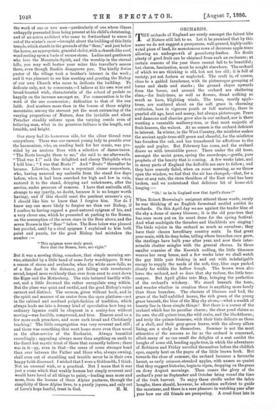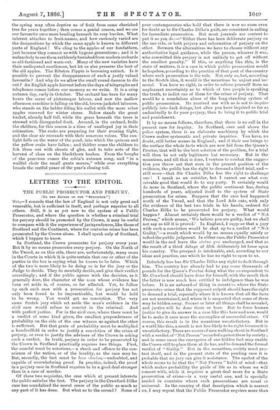ORCHARDS.
THE orchards of England are surely amongst the fairest bits of Nature still left to us. Let it be premised that by this name we do not suggest a prosperous, well-pruned, highly-culti- vated piece of land, its monotonous rows of decorous apple-trees allowing an undergrowth of gooseberry-bushes. No doubt plenty of good fruit can be obtained from such an enclosure; at certain seasons of the year these cannot fail to be beautiful ; but charm, fascination, must be sought elsewhere. The orchard of which we are thinking is old, but not too old ; it is full of variety, yet not forlorn or neglected. The croft is, of course, close to a gabled farmhouse, with its picturesque grouping of barns and sheds and stacks ; the ground slopes upwards from the house, and around the orchard are sheltering elms,—for fruit-trees, as well as flowers, dread nothing so much as keen, blighting winds. The trees, mostly applc- trees, are scattered about on the soft grass in charming confusion, here in vigorous youth or full maturity, there in gnarled old age, bent and mossy, but always picturesque. Pears and damsons and cherries grow also in our orchard, nor is there wanting a venerable mulberry-tree, or that most majestic of fruit-bearers, the walnut. At no season is the orchard deficient in interest. In winter, in the West Country, the mistletoe makes the ancient apple-trees still green and cheerful, for the mistletoe has forsaken the oak, and has transferred its affections to the apple and poplar. But February has come, and the orchard draws us with irresistible power. There under the old trees, amongst the moist grass, spring the snowdrops,—gentle, pure prophets of the beauty that is coming. A few weeks later, and in many parts of England the daffodils are sure to follow ; and they have scarcely faded, when on some morning, as we throw open the window, we feel that the air has changed,—that, for a time at any rate, the stern thraldom of the East wind has been broken, and we understand that delicious bit of home-sick longing :—
" Oh ! to be in England now that April's there !"
When Robert Browning's emigrant uttered those words, surely he was thinking of an English farmstead nestled amidst its orchards. On this April day we see against the tender blue of the sky a dome of snowy blossom ; it is the old pear-tree that has once more put on its court dress for the spring festival. And what madrigals the thrushes and blackbirds are singing ! The birds rejoice in the orchard as much as ourselves ; they have their chosen hereditary country seats. In that great pear-main, with its deep holes, telling where branches once grew, the starlings have built year after year, and now their inter- minable chatter mingles with the general chorus. In those smaller ci annies of the Keswick codling, the little titmouse weaves her snug house, and a few weeks later we shall watch the gay little pair frisking in and out with indefatigable energy to supply the needs of the soft, tiny, blue caps packed closely far within the hollow bough. The brown wren also loves the orchard, and so does that shy recluse, the little tree. creeper. But April glides into May, bringing the perfection of the orchard's witchery. We stand beneath the trees, and wonder whether in creation there is anything more lovely than these branches. The clusters of blossom and bud, the grace of the half-unfolded leaves, the rich green of the young grass beneath, the blue of the May sky above,—what a wealth of beauty lies in these simple things ! But there is a corner of the orchard which has its peculiar charm ; the clear pond claims as its own the old quince-tree, the wild crabs, and the blackthorns; and truly the quince-blossoms, with their tints delicate as those of a shell, and their grey-green leaves, with the silvery silken lining, are a study in themselves. Summer is not the most attractive of the seasons so far as the orchard is concerned, albeit many of us can recall the delights of a seat amidst the boughs of some old, bending apple-tree, in which the adventures of Robinson and Friday unrolled themselves before the childish eyes, eagerly bent on the pages of the little brown book. But towards the close of summer, the orchard becomes a favourite haunt, as early crimson-streaked apples, with names so quaint that they suggest histories, begin to ripen, dropping on the grass on dewy August mornings. Then comes the glory of the orchard's year as September and October bring round the time of the fruit harvest. To enjoy these strolls under the laden boughs, there should, however, be education sufficient to guide the saunterer, and there is a rare pleasure in watching year after year how our old friends are prospering. A cruel frost late in
the spring may often deprive us of fruit from some cherished tree for years together ; then comes a genial season, and we see our favourite once more bending beneath its rosy burden. What interest attaches to fruit-names, and how curiously varied are the designations by which the same apple is known in different parts of England ! We cling to the apples of our forefathers, just because they connect us with bygone generations ; and it is melancholy to see them ruthlessly banished from modern orchards as old-fashioned and worn-out. Many of the new varieties have their undisputed excellences, but let us also preserve the best of the old apples. The Ribston Pippin is becoming extinct. Is it possible to prevent the disappearance of such a justly valued favourite ? And why do we allow the small round damson to die out ? An English apple harvest before the days of telegraphs and telephones comes before our memory as we write. It is a crisp autumn day, early in October. The orchard has been for many hours the scene of picturesque labour, and now the mellow afternoon sunshine is falling on the old, brown-jacketed labourer, who stands on the ladder filling his wallet with the more sober apples reserved for winter stores. Below stands the great basket, already half full, while the grass beneath the trees is strewed with disregarded fruit. Around, in the orchard, frolic the children, for this season is a time of unalloyed joy in their estimation. The rooks are preparing for their evening flight, and the clear air resounds with their sonorous voices. The sun- light falls on the water of the pond, into which the quinces and the yellow crabs have fallen ; and thither come the children to fish them out with shouts of glee, and to take note of the harvest of sloes on the blackthorn bushes. From the boughs of the pear-tree comes the robin's autumn song, and "in a wailful choir the small gnats mourn," while over everything broods the restful peace of the year's closing toil.



































 Previous page
Previous page